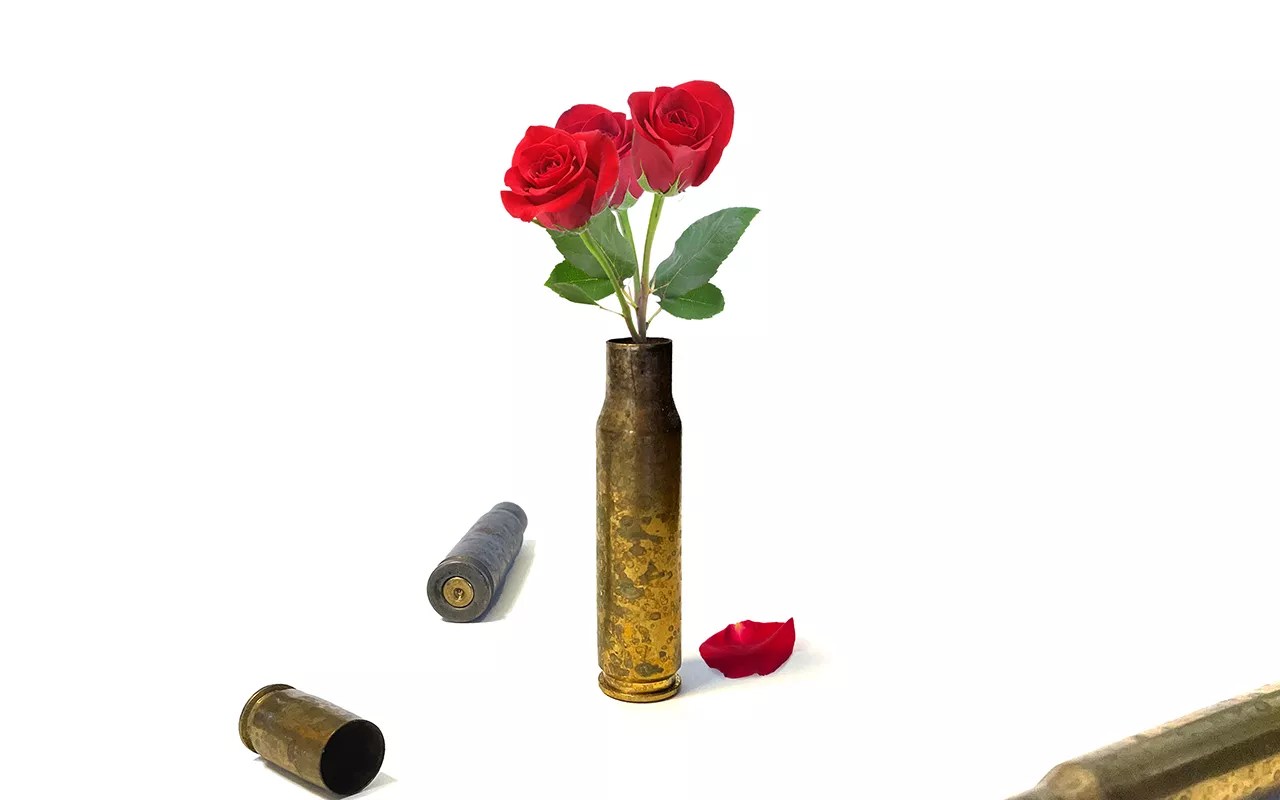
Getty Images/Westword Photo Illustration

Audio By Carbonatix
A week after Denver’s tattoo shop shootings on December 27, 2021, Z Williams was scrolling through Twitter while sitting in Hope Tank, a socially conscious gift shop right by Sol Tribe, where two people had died in the killing spree; the shop had become a hub for community support.
“I saw this pop-up that said, ‘If you want to donate to the victims of the Sol Tribe shooting, the only reliable place that you can do that that’s transparent and valid, that’s better than the GoFundMes, is giving to the Colorado Healing Fund,'” Williams recalls.
Williams, a founder of Bread and Roses Legal Center, wondered who was behind the Colorado Healing Fund and whether the organization had reached out to anyone in the community affected by the tragedy. After asking around, Williams determined that CHF had done no such outreach.
Instead, it was responding through a third-party agency, the Colorado Organization for Victim Assistance, which often works with police departments to respond to mass tragedies. “We want to respect victim confidentiality and privacy, so we try to work within a single point-of-contact system where their advocates are the victims’ families and those immediately impacted’s best point of contact,” explains Jordan Finegan, CHF executive director.
“In my mind, especially with that kind of event, it’s very important to make sure that if you’re fundraising for anyone, that you have a connection to the community, and a tie, and you have their permission to do that,” responds Williams, who’d started rallying support right after the tattoo tragedy.
“It’s very important to make sure that if you’re fundraising for anyone, you have a connection to the community.”
Eleven months later, as reports of the Club Q shooting started coming in early on November 20, Williams knew there was no time to waste.
“As a member of the queer community, as someone who has friends and people that I have deep love for in Colorado Springs, as someone who’s been through – not the exact same, because no two events are the same – the aftermath of one of these tragedies, I just knew that there are going to be a lot of unmet needs, and that the institutions are not designed to keep communities like the queer community safe or resourced,” Williams says.
Working through Bread and Roses, Williams looked for ways to get unrestricted support to those at Club Q that night as quickly as possible.
In addition to making sure the community was consulted, Williams recognized other challenges specific to the Colorado Springs event. Some of the victims might fear being outed, or might not go by their legal names, or might need support from people who are not their legal partners or members of their biological families. And historically, the police haven’t always treated LGBTQ+ people or people of color well, Williams says; this response would require a sensitivity that Williams worried was lacking at both the Colorado Healing Fund and the Colorado Organization for Victim Assistance.
And in fact, after the community pushed back, the Colorado Healing Fund announced on January 17 that a new partner, Community Health Partnership, would be the liaison for any Club Q victims who were uncomfortable interacting with law enforcement. While COVA would continue to disburse the payments, a Club Q Advisory Committee would advise CHF in its response to the tragedy.
But according to Williams, that move by CHF didn’t fix the problems.
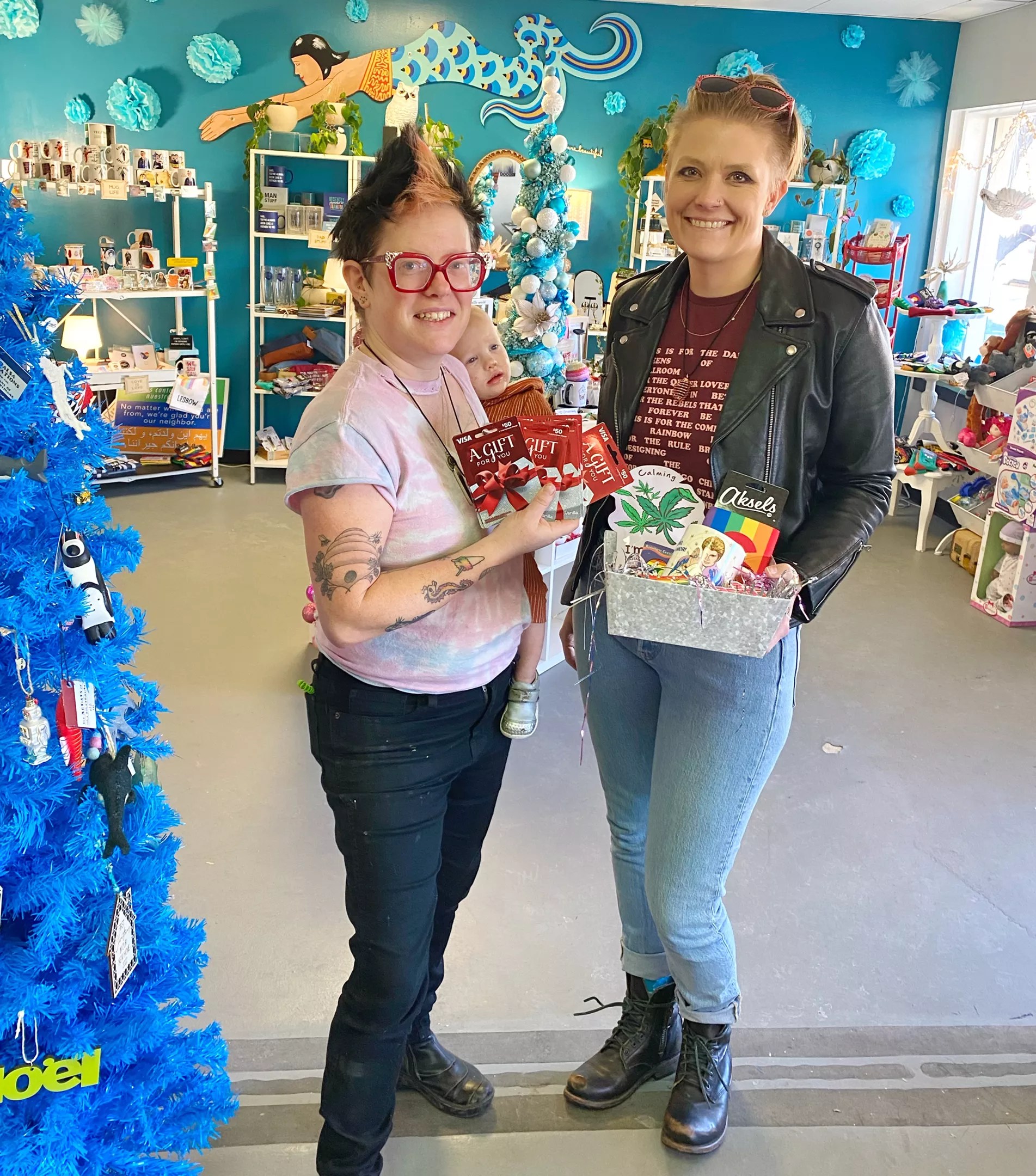
Bread and Roses co-founders Z Williams (left) and Erica Unger picked up donations for Club Q victims at Hope Tank.
Erika Righter
Colorado has seen far too many tragedies since the 1999 killings at Columbine High School. And after each one, there have been controversies over how support – both emotional and financial – was provided to victims and others affected.
After the Aurora theater shooting in July 2012, then-Governor John Hickenlooper brought in the Community First Foundation, which connects donors and nonprofits, to start collecting money for the victims. It created the Aurora Victim Fund, which gave the first $100,000 it raised to local nonprofits and government agencies, including Aurora Mental Health and the Aurora Chamber of Commerce.
That’s not what people thought they were donating to, charge Tom and Caren Teves, whose son Alex was murdered protecting his girlfriend. In August 2012, Teves and the families of others who were killed went public with their accusations that Community First handled the Aurora Victim Fund irresponsibly.
Since then, some of those families have continued to warn others whose loved ones die in mass shootings, as well as the public, that their donations may not be going to the intended place. Each time a tragedy happens, they start looking out for the new members of the worst club in the world, reliving what happened to them as they try to stop the past from repeating itself.
“It was just a band of thieves who siphon off money from good people trying to help people,” Tom Teves says.
In 2016, then-Colorado Attorney General Cynthia Coffman formed a group through the AG’s Office of Community Engagement to discuss problems with this state’s response to mass tragedies.
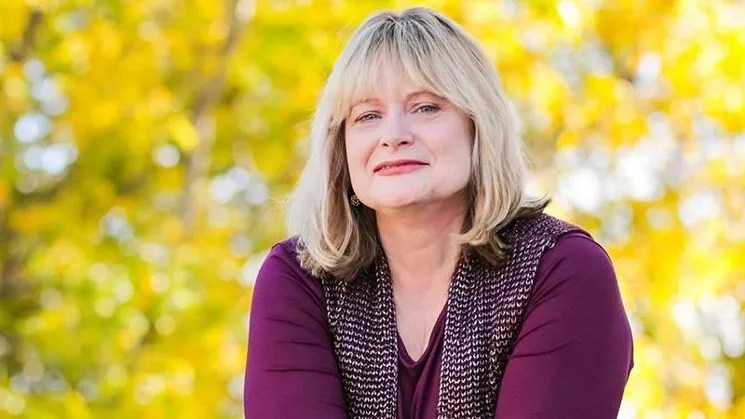
Attorney General Cynthia Coffman pushed for the creation of the Colorado Healing Fund.
Facebook file photo
The attorney general is responsible for consumer protection, and the office had found examples of people using mass tragedies as an excuse to start fundraisers that did not benefit the victims, Coffman explains. And even when intentions were good, the AG’s group determined that there should be a way to get the money out immediately, through an organization that was outside of the government.
“After working 25 years in government, I didn’t want it to be at the mercy of a budget process in the legislature,” Coffman says. “I didn’t feel like that was fair, so we chose to make it separate.”
The AG’s office hired an outside attorney to do the necessary legal work to set up the Colorado Healing Fund so that it would be a separate entity from that office, then started the program with $1 million from the AG’s budget.
“We used money to seed the Colorado Healing Fund that came from what’s called custodial funds,” Coffman says. “They are monies that are a result of settlements of lawsuits in Colorado on behalf of the people of Colorado, and the Attorney General’s Office puts those monies in the state treasury but holds them in an account that is to be used for purposes such as this.”
By 2018, the Colorado Healing Fund was up and running, with Coffman as the board chair. “The feeling was that since our office had founded it, I would chair it for the first years of its establishment,” Coffman says. Her office created a process where people could write proposals and apply for funding; her staffers would do an evaluation of the request and come to her only for a final signature, she says.
Coffman only served as AG for one term (she made an unsuccessful run for the Republican nomination for governor in 2018), but remained as chair of the Colorado Healing Fund, which hired Finegan as its sole employee in 2019.
Sadly, the tragedies kept coming.
For the Healing Fund to activate, an event must be indiscriminate and affect a large group of people, with three or more killed, according to Finegan, though there’s some flexibility to those guidelines. For example, CHF activated after the STEM School shooting in May 2019 despite there being only one casualty, because the community was deeply impacted.
The arrangement calls for collecting funds and working with COVA or another partner organization to distribute them. Victims of a mass-casualty event are contacted by the police department in that jurisdiction, then assigned a victim advocate who works with the CHF partner to request money for a victim’s needs. Often, a victim does not even know that CHF has been involved.
“We’re not the people on the ground,” Finegan says. “We recognize that those victim advocates know what individuals need, what is coming up, how to support them at that time as quickly as possible with whatever money we have.”
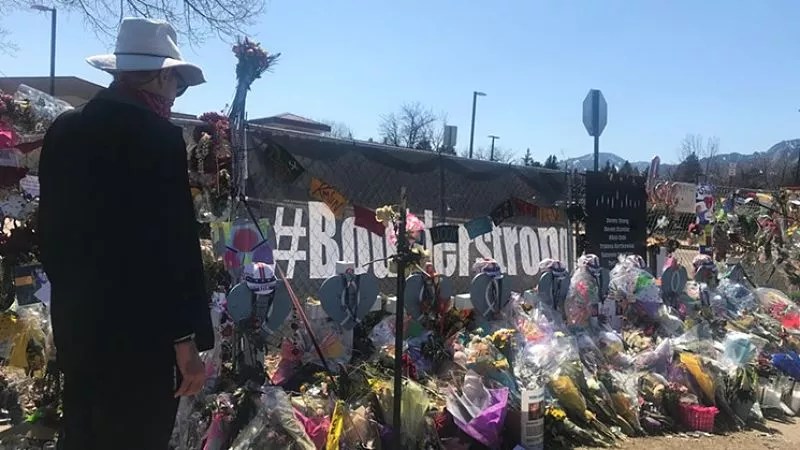
After the shooting at the Boulder King Soopers, CHF activated.
Michael Roberts
But having those other agencies involved can add insult to injury, survivors say.
Starr Bartkowiak’s daughter, Lonna Bartkowiak, was one of ten people murdered at the King Soopers on Table Mesa Drive in Boulder in March 2021. Starr estimates that she received over $200,000 through victim assistance, including funds that she later learned were from CHF. And while she says she’s very grateful for that, she wonders if others received as much: She’s suspicious because CHF collected more than ten times the amount she received.
In its most recent report about the King Soopers shooting, posted on its website last June, CHF says it gave about $3 million to COVA and $300,000 to the Boulder Strong Resource Center, a community mental health center in Boulder. It collected nearly $4.8 million, with just over $220,000 going to administrative fees. In the report, CHF says that the rest of the money will be used for long-term support.
“They advertise on the internet that they are the best place to make sure that all of the donations that came in would go directly to the victim’s families, and that never happened. And I never even got a phone call,” Bartkowiak says.
Bartkowiak had no idea that CHF was using her daughter’s name in fundraising efforts until months after Lonna’s funeral. She says she feels as though the organization laid in wait for a tragedy to begin fundraising, using her daughter’s murder – and those of the others killed at King Soopers – to support its mission rather than doing anything proactive.
“They can’t imagine what we’re going through. Nobody can, unless you’ve lost somebody that you love like that.”
Now, after any mass-casualty event, Bartkowiak researches whether funds are being properly distributed. She says it breaks her heart when the tragedy is in Colorado, because she knows the pain CHF can cause.
She had an ally in her fight: John Mackenzie, whose wife, Lynn Murray, was also killed in the King Soopers shooting. Before Mackenzie died last November, he and Bartkowiak had been working with Victims First, a network of surviving victims of mass-casualty crimes whose members include people close to victims of the Aurora theater shootings. Micayla Medek, the cousin of its president, Anita Busch, died in that tragedy.
The Teves and Busch had helped form the National Compassion Fund in 2013. After a mass tragedy, the NCF finds a local partner to host a fund that will give 100 percent of funds directly to victims, with no pass-through agencies, victim advocates or additional nonprofits involved. People can still donate to the Club Q Victims and Survivors Compassion Fund it set up.
Because no one can understand the experience of losing a loved one in a mass-casualty event unless it happens to them, no outside group should be directing how funds intended for victims are distributed, the National Compassion Fund says; any money collected should be divided evenly among victims’ families without any need to jump through any hoops.
That way, the families will not have to figure out how to navigate any system, instead using that time to grieve, heal and situate themselves in their new normal. There is no straight path to recovery – or, as Bartkowiak points out, no real recovery at all.
“They can’t imagine what we’re going through,” Bartkowiak says. “Nobody can, unless you’ve lost somebody that you love like that. They’re gone. What do you do? To this day, I have a hole in my heart that’s just filled with cement.”
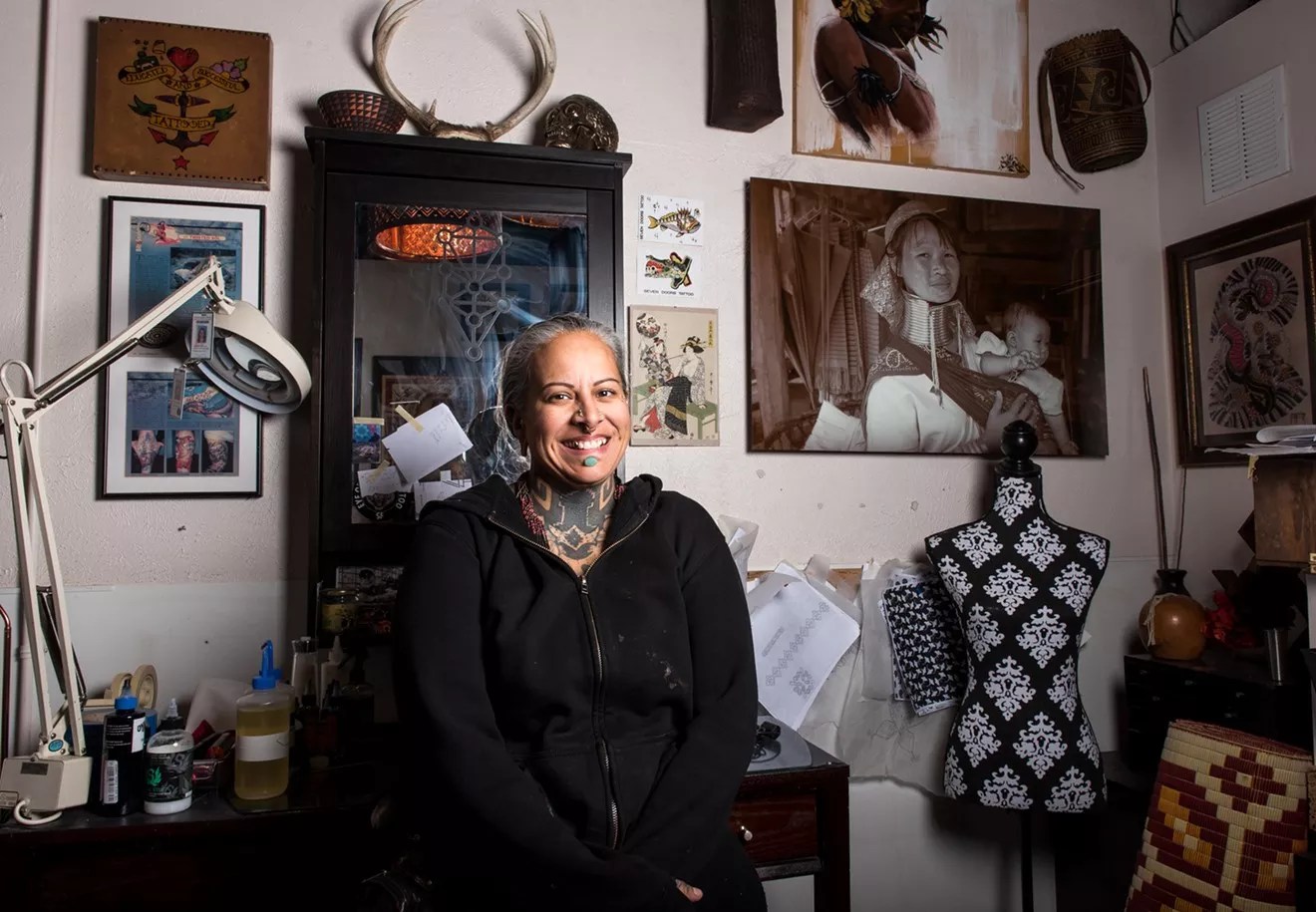
Alicia Cardenas died in the December 27, 2021, shootings.
Jake Cox
In addition to the severity of a tragedy, CHF considers whether people are willing to give before it activates a response.
“A key piece for us is, we activate our seed fund so we can get money out as quickly as possible, but we also have to pay attention to what’s coming in that we’re able to give out,” Finegan says.
After the Club Q shootings, she notes, CHF could tell by the next day that it would have enough donations to make cash disbursements to families through COVA.
According to CHF, it can get money to people faster than any other organization because of its seed fund, which it replenishes with donations to match the amount it initially gives out.
But that wasn’t the case after the December 27, 2021, shootings, in which a gunman murdered five people, some of whom he’d targeted because of personal grievances. Chief among those killed were members of the city’s tattoo community, including Alicia Cardenas and Alyssa Gunn Maldonado, who were killed at Sol Tribe, Cardenas’s shop.
People connected to Sol Tribe collected gift cards to give out immediately to those impacted. That was one of the tactics that Williams and Bread and Roses pushed after the Club Q shooting, too, while they gathered information specific to the victims’ needs.
“There was this idea of, we’re experts in responding to mass shootings, and all people who are impacted by mass shootings are the same,” Williams says. “Every group is different. Even if you take all the people who were in the room that night, each one of them is different, and there’s no one person that speaks for all of them.”
After the Club Q shooting, for example, there was an urgent need for chest binders, which are wraps or sports bra-like attire that transgender men and nonbinary people sometimes use to masculinize their chests. In an emergency, binders sometimes need to be cut off for medical treatment, or they may be damaged in the chaos. And those unfamiliar with this gender-affirming practice may ignore the very real need for quick replacements.
“Someone from one of these institutions, when we said people are needing binders urgently, they said, ‘Oh, like from Office Depot?'” Williams remembers.
Others more familiar with the community got involved. Good Judy Garage, a queer-owned-and-operated auto service and repair shop that opened in Denver in 2021, hosted a fundraiser with an original goal of $5,000; it has raised almost $1 million. Faith Haug, who co-owns Good Judy, says it was important for the garage to support another queer-owned-and-operated business after the Club Q shootings.
“Victims from other mass shootings nationwide reached out and shared their experiences with me,” Haug says. “After hearing what other victims have gone through with other organizations, it was clear to me that partnering with the National Compassion Fund was the most ethical course of action to take.”
“Victims from other mass shootings nationwide reached out and shared their experiences with me.”
It’s a misconception that CHF decides what is best for victims when it directs funds through nonprofits, Finegan responds, because all of the money collected goes to services that help people.
CHF does not have reports readily available for donations connected to the tattoo shop shooting or the Mother’s Day 2022 shooting in Colorado Springs, in which seven people including the shooter were killed at a birthday party. Since the amount of money collected in connection with those events was smaller than the amount collected in Boulder, Finegan says the group’s primary focus has been accounting for the large amount of money donated for King Soopers shooting victims.
For the Mother’s Day shooting, Finegan says the fund brought in $32,000 and gave out $75,000; it filled the gap with its seed fund. For the tattoo shop shootings, the fund brought in around $90,000 and gave out $50,000, with plans to disburse the rest for long-term needs.
“That’s why there hasn’t been a report written, just because not much happened,” Finegan says. “I’m one staff person, and I’ve had three shootings that happened in one year, as well, so it was a lot.”
In the beginning, the Colorado Healing Fund applied 5 percent of all donations to administrative costs. Last August, it raised that amount to 10 percent. Finegan says the increase was necessary for the solvency of the organization; it simply needed more funding to continue operating.
“It has at times been difficult, because we tried to raise money to cover overhead and operations, and there’s just not a lot of private foundations that give for operating expenses,” Coffman notes.
That increase just gave critics more reason to worry. Ultimately, an anonymous donor stepped forward to cover all of CHF’s administrative costs connected to the Club Q shooting response. But that didn’t comfort the critics.
“My organization has been working very hard to try and share our concerns with the Colorado Healing Fund and push them to actually be transparent,” Williams says. “To make sure that 100 percent of money raised goes to the victims, which I think now is getting very deceptively messaged. They’ve said that they’re no longer taking 10 percent, but 100 percent of the money still goes to nonprofits, not to victims, and that’s a fundamental difference.”
Victims First wrote an open letter about CHF in December. “By covering those administration costs,” it said, “the nonprofit industrial complex has worked together, behind closed doors, to secure funds for nonprofits that were collected off the backs of mass shooting victims.”
The complaints aren’t just about administrative costs, though. Victims and their advocates charge that COVA, CHF’s usual partner, has often been insensitive at best, and sometimes harmful.
COVA retraumatized people by requiring that they list the name of the person who committed the crime on paperwork and also asking detailed questions about individual finances, they say. Victims complained that the form was too invasive and felt demeaning at times, as if they had to prove that they deserve money.
Mari Dennis took over as executive director of COVA this fall. She says that the organization listened to those complaints, and implemented a change for the Club Q response. Previously, it had used the same form it had given victims of crimes that aren’t mass casualties when they requested support from a fund filled through grants, not CHF.
“You have to gather so much information for your grant reports for federal funding,” Dennis says. “For these mass tragedies, we don’t have to do that, so that’s why I changed the form completely, just to get the exact information we need.”
COVA’s form for mass casualties was changed to require only the name of the person in need, the name of the victim if the person in need is not the actual victim, the type of assistance needed and the amount requested. COVA doesn’t have to ask for approval from CHF for each line item, but people do need to specify what they are requesting the money for.
“COVA kind of acts as a pass-through agency,” Dennis says, “because the Healing Fund can’t, by their own policies, be the ones to do this. They have to work with a nonprofit. So because we’re already partnering with the advocates that are doing the front-line work, then we can be that pass-through agency.”
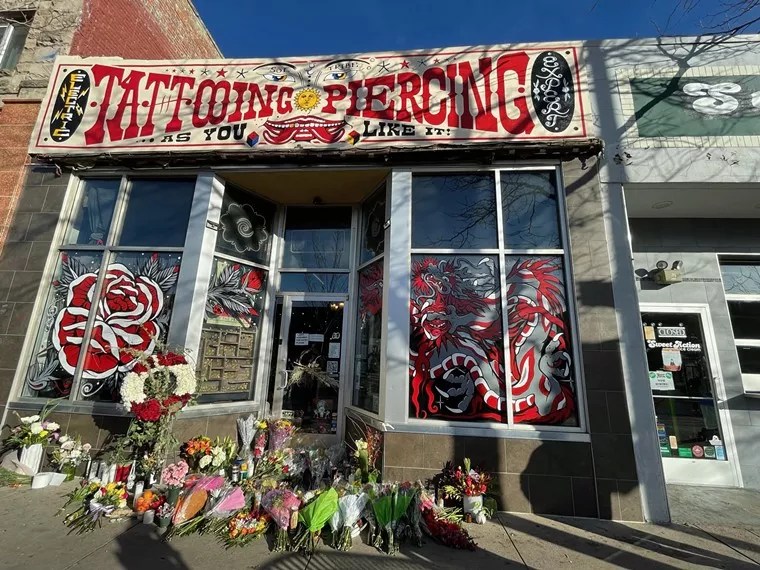
Catie Cheshire
Finally, two months after the Club Q shootings, the Colorado Healing Fund brought in the Community Health Partnership as a new navigator for those victims, while COVA continued to distribute funds.
“The navigator will continue the work to fill critical gaps in victim support, particularly for those who may face additional trauma in interacting with law enforcement and navigating processes and forms that are not LGBTQIA+-inclusive,” CHF said in a press release announcing the change.
The Community Health Partnership is a nonprofit that promotes partnerships to tackle health issues in Colorado. One of its focus areas is LGBTQIA+ health care. “Community Health Partnership is continuing to work with any individuals that they can and will likely be a primary point with long term needs,” Finegan says of the partnership. “They are not replacing, they are just adding capacity.”
But according to an open letter from Bread and Roses on February 7, the addition hasn’t done much to fix CHF’s Club Q response.
“CHF’s model requires survivors to request money from orgs managing CHF dollars and requires survivors to justify expenses, and to gather and submit documents for each purchase and expense in order to access aid,” the letter says. “This process is invasive and time-consuming, and prevents survivors from planning long term, because they do not know when the next relief check is coming, or what will be covered.”
The letter calls for CHF to immediately empty its Club Q fund and disburse it to the victims in a lump sum. And in fact, on February 10, CHF distributed an additional $1.3 million in donations, bringing the disbursements to $1.9 million out of 2.2 million collected.
But according to Finegan, it needs to keep some funds for long-term needs. “That model is recommended by trauma experts because it is common for victims to demonstrate additional impact in the months and years following an incident,” CHF’s website notes in a response to the Bread and Roses letter.
But how long will it wait? Williams says that CHF wasn’t responsive to victims’ requests for help on the one-year anniversary of the tattoo shop shootings, which would seem to qualify as long-term.
“Some of the most important things we can do for survivors and victims’ families is honor their privacy and autonomy,” Williams notes in a statement accompanying the Bread and Roses letter. “They know what they need.”
Even as CHF has made some changes to its program, Coffman still believes in its basic mission.
“We were told by all of the folks that we’ve worked with who’ve been through this, ‘You will be the lightning rod for complaints and for people who are psychologically injured as a result of the tragedy, and they’re angry because of their loss that can never be compensated for,'” she says. “I’m not gonna say it doesn’t hurt when people criticize us for the way that we’re doing things, because we’re there to help, but we also have the resolve that we know that what we’re doing is right, and we are able to help more people because of the policies and the mechanisms we have in place.”